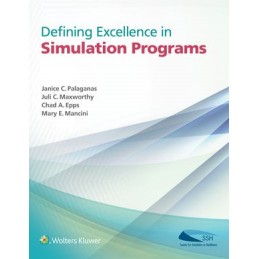1. SIMULATION STANDARDS
1.1 Accreditation Standards
Ellen S. Deutsch and Janice Palaganas
1.2 Standards of Best Practice
Suzan E. Kardong-Edgren, Teri Boese, and Valerie M. Howard
1.3 Simulation Center Program Metrics
Sandra J. Feaster, John H. Shatzer, Troy Reihsen, John W. Lutz, and Farrah F. Leland
1.4 Educators and Certification
Andrew Spain, Cate F. Nicholas, Connie Lopez, and
Katie Walker
1.5 Quality Improvement in Simulation – Would We Have It Any Other Way?
Juli Maxworthy and Jared M. Kutzin
2. TYPES OF SIMULATION PROGRAMS
2.1 Infrastructure/Staffing Models and Job Descriptions
Sara Kim, Wendy Hewitt, and Andrew Spain
Text Box: Scheduling Software
Chad Epps and Penni I. Watts
2.2 Optimizing Education with in situ Simulation
Justin L. Lockman,Aditee P. Ambardekar, and Ellen S. Deutsch
2.3 Mobile Simulations
Brent Thorkelson
2.4 Interprofessional Simulations
Janice Palaganas and Laura Rock
Text Box:How Simulation Can Further IPE
Beth Mancini
2.5 Continuum of Care
Deb Navedo and Pat Reidy
2.6 Just-in-time Training Programs
Anne Marie Monachinoand Stephanie Tuttle
2.7 Bootcamps
Roberta L. Hales and Stephanie Tuttle
2.8 Systems Integration
Yue Dong, Juli Maxworthy, and Bill Dunn
2.9 A Model for Establishing a Rural Simulation Partnership
RebekahDamazo and Sherry Fox
3. SIMULATORS
3.1 The Taxonomy of Simulation
Chad Epps and Janice Palaganas
3.2 Mannequins
Frederick L. Slone and Samsun Lampotang
Text Box: How I Got Involved
Jeff Cooper
David Gaba
3.3 Standardized Patients
Kathy Schaivone, Tamara L. Owens, and
Gayle Gliva-McConvey
3.4 Simulated Persons (aka "Confederates")
Jill S. Sanko, Ilya Shekhter, Richard R. Kyle, Jr., and
David Birnbach
TEXT BOX:Role Exit
Janice Palaganas and Peggy Wallace
Text Box: Using Volunteers
Laura Rock
3.5 Procedural Training
Roy Phitayakorn and Daniel A. Hashimoto
3.6 Hybrid
Wendy Gammon
3.7 Virtual Simulation
Eric B. Bauman and Penny Ralston-Berg
3.8 Repurposing of Equipment
Shad Deering and Taylor L. Sawyer
3.9 Warranties/Fix-It-Yourself
Marcus Watson
4. FUNDING
4.1 Where’s the Money? Sources of Revenue
Jennifer A. Calzada
4.2 Establishing Your Budget
Stephanie Tuttle
4.3 How to Write a Thorough Business Plan
M. Scott Williams and Danyel L. Helgeson
4.4 How to Create Buy-in
Katie Walker and Ian Curran
Text Box: How to Create Champions
Paul Phrampus
4.5 Fundraising: A Potential Additional Source of Income for the Research and Educational Activities of a Clinical Simulation Center
Guillaume Alinier andJean-Claude Granry
4.6 Grant Writing
Sandrijn M. van Schaik
4.7 Partnering with Vendors
David M. LaCombe and Graham Whiteside
5. MANAGEMENT
5.1 Business Needs and Assets Assessment
Sandra J. Feaster and Jennifer A. Calzada
Text Box: Determining Pricing for Simulation Services and Ensuring Sustainability
Paul Pribaz and Christine S. Park
5.2 Policies and Procedures
Thomas A. Dongilli, Ilya Shekhter, and Jesika S. Gavilanes
5.3 Writing and Implementing a Strategic Plan
Gail Johnson and Jeanette L. Augustson
Text Box: Feedback Loops and Communication–
Cascading to Keep It Flowing
Juli Maxworthy
Text Box: Projects Galore! How Do I Handle This?
Janice Palaganas
5.4 Writing and Implementing a Systematic Evaluation Plan
Gail Johnson
5.5 Management of Standardized Patient Centers
Nancy Heine and Diane M. Ferguson
5.6 Community Applications
Juli Maxworthy and KT Waxman
6. ENVIRONMENTAL DESIGN
6.1 Designing a Simulation Center: Key Pointers Taking into Account Intended Primary and Secondary Usage of the Facilities
Guillaume Alinier, Francois Lecomte, and Ismaël Hssain
6.2 Space: Potential Locations to Conduct Full-scale Simulation-based Education
Guillaume Alinier, Jean Claude Granry, Ashwin A. Kalbag, Roger Lister Kneebone, and Fernando Bello
6.3 Technical Infrastructure
Brian Moores and Amar P. Patel
6.4 Transition to a New Center
Wendy Gammon and H. Michael Young
7. EDUCATIONAL DEVELOPMENT
7.1 Learning Needs Assessment
Rebecca Wilson and Debra Hagler
7.2 How to Integrate Simulation into Curriculum
Soledad Armijo
7.3 Common Theories
Brad Morrison and Cathy Deckers
7.4 Assessment
Wendy Anson
7.5 CME
Jason Zigmont
8. FACULTY DEVELOPMENT
8.1 Educator Training/Simulation Methodology Courses
Jason Zigmont, Nichole I. Oocumma, Demian Szyld, and
José Maestre
8.2 Debriefing
Keith Littlewood and Demian Szyld
8.3 Realism and Moulage
Rebekah Damazo and Sherry D. Fox
8.4 Contingency Planning
Ceci Canales and Yue Ming Huang
8.5 The Ethics of Simulation
Amy B. Smith and Stephen E. Lammers
9. RESEARCH
9.1 Research in Healthcare Simulation
Marjorie Lee White and Dawn Taylor Peterson
9.2 Simulation Research Considerations
Suzan E. Kardong-Edgren, Peter Dieckmann, and James C.
Phero
9.3 Institutional Review Board
Dawn Taylor Peterson and Marjorie Lee White
10. Resources
Alicia Gill Rossiter, Susan Garbutt, and Rita F. DAoust
Glossary
Index




 Delivery policy
Delivery policy
 Security policy
Security policy
 Return policy
Return policy
